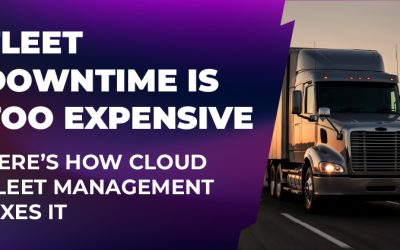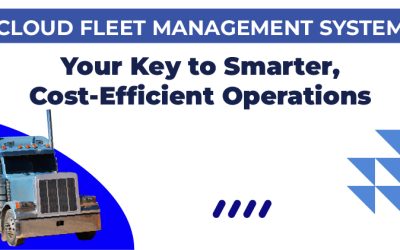In today’s fast-paced transportation industry, managing a fleet efficiently is critical to maintaining competitiveness. TMS-Digital, a leading TMS software and solutions provider in the US, leverages the power of IoT-enabled fleet tracking and management systems to transform fleet operations. This comprehensive blog explores how IoT technology integrates with fleet management to enhance efficiency, safety, and cost savings, providing a detailed look into its various aspects and benefits.
What is IoT-Enabled Fleet Tracking and Management?
The Internet of Things (IoT) connects devices and sensors to the internet, allowing them to communicate and share data. In fleet tracking and management, IoT technology enables real-time monitoring and control of vehicles, offering insights that improve operational efficiency, safety, and overall performance. TMS-Digital’s IoT-enabled solutions provide a robust platform for fleet managers to optimize their resources and streamline their operations.
Benefits of IoT-Enabled Fleet Tracking and Management
Enhanced Operational Efficiency
IoT devices collect and transmit data on vehicle location, speed, fuel consumption, and maintenance needs. This data helps fleet managers make informed decisions, optimize routes, reduce fuel consumption, and prevent downtime by scheduling timely maintenance.
Improved Safety and Compliance
IoT technology monitors driver behavior, including speeding, harsh braking, and acceleration. By analyzing this data, fleet managers can enforce safety protocols, provide targeted training, and ensure compliance with regulations, thereby reducing accidents and enhancing safety.
Cost Savings
Real-time monitoring of vehicle performance and maintenance needs prevents costly breakdowns and extends vehicle lifespan. Efficient route planning reduces fuel consumption and labor costs, leading to significant savings.
Better Customer Service
Accurate tracking and real-time updates enable fleet managers to provide precise delivery times, improving customer satisfaction. Enhanced communication capabilities ensure customers are informed about delays or changes, fostering trust and reliability.
 Key Components of IoT-Enabled Fleet Management Systems
Key Components of IoT-Enabled Fleet Management Systems
Telematics Devices
Telematics devices are the backbone of IoT-enabled fleet management. They collect data on vehicle location, speed, engine performance, and more, transmitting this information to central systems for analysis.
GPS Tracking
GPS tracking provides real-time location data, allowing fleet managers to monitor vehicle positions, optimize routes, and respond quickly to any issues.
Sensors and Actuators
Various sensors monitor aspects like tire pressure, fuel levels, and engine health, providing crucial data for maintenance and operational decisions. Actuators can remotely control certain vehicle functions, enhancing control and responsiveness.
Data Analytics Platforms
Advanced analytics platforms process and analyze the vast amounts of data collected, offering actionable insights and predictive maintenance alerts. TMS-Digital’s platform integrates seamlessly with IoT devices to provide a comprehensive view of fleet operations.
How TMS-Digital Integrates IoT in Fleet Management
Comprehensive Software Solutions
TMS-Digital offers a suite of software solutions that integrate IoT technology with traditional fleet management practices. These solutions provide real-time visibility, predictive maintenance, and advanced analytics to optimize fleet operations.
Customizable Dashboards
Customizable dashboards allow fleet managers to view key metrics and data points relevant to their operations. These dashboards provide a user-friendly interface to monitor vehicle health, track performance, and identify areas for improvement.
Seamless Integration
TMS-Digital’s IoT-enabled systems are designed to integrate seamlessly with existing fleet management software, ensuring a smooth transition and minimal disruption to operations.
Real-Time Alerts and Notifications
Real-time alerts and notifications keep fleet managers informed about critical issues, such as maintenance needs, driver behavior, and route deviations, enabling proactive management and quick response to potential problems.
Applications of IoT-Enabled Fleet Management in Various Industries
Logistics and Transportation
IoT-enabled fleet management systems enhance logistics and transportation operations by providing real-time tracking, route optimization, and delivery scheduling, improving efficiency and customer satisfaction.
Public Transportation
In public transportation, IoT technology ensures timely maintenance, monitors vehicle performance, and enhances passenger safety through real-time tracking and communication.
Construction and Heavy Equipment
For construction and heavy equipment, IoT-enabled systems monitor machinery health, track usage, and ensure compliance with safety regulations, reducing downtime and enhancing productivity.
Emergency Services
Emergency services benefit from IoT-enabled fleet management through real-time tracking, efficient dispatching, and maintenance alerts, ensuring vehicles are always ready to respond quickly to emergencies.
Challenges and Solutions in Implementing IoT-Enabled Fleet Management
Data Security and Privacy
One of the primary challenges is ensuring the security and privacy of the vast amounts of data collected. TMS-Digital addresses this by implementing robust encryption and secure data storage solutions.
Integration with Legacy Systems
Integrating IoT technology with existing legacy systems can be challenging. TMS-Digital provides flexible and scalable solutions that are compatible with various systems, ensuring smooth integration.
Cost of Implementation
The initial cost of implementing IoT-enabled systems can be high. However, TMS-Digital offers cost-effective solutions and highlights the long-term savings and ROI, making it a worthwhile investment.
Future Trends in IoT-Enabled Fleet Management
Artificial Intelligence and Machine Learning
The integration of AI and machine learning with IoT will enhance predictive analytics, automate decision-making, and improve overall efficiency.
Blockchain for Data Security
Blockchain technology will play a crucial role in enhancing data security and transparency in IoT-enabled fleet management systems.
Connectivity
The advent of 5G and more advanced connectivity will enable faster data transmission, real-time decision-making, and more reliable communication between IoT devices.
Conclusion
IoT-enabled fleet tracking and management systems are revolutionizing the transportation industry. By integrating advanced technologies into fleet operations, companies like TMS-Digital are enabling more efficient, safe, and cost-effective transportation solutions. These systems offer real-time data insights, enhance vehicle and driver performance, and streamline maintenance processes, ultimately leading to increased productivity and reduced operational costs.
As the IoT continues to evolve, its applications in fleet management will only become more sophisticated, providing even greater benefits to businesses. Adopting IoT-enabled systems is no longer a luxury but a necessity for staying competitive in today’s fast-paced market. By embracing these technologies, companies can ensure they are well-positioned to meet the demands of the future, delivering superior service to their customers while maintaining optimal operational efficiency.
FAQs
What is IoT-enabled fleet tracking?
IoT-enabled fleet tracking uses internet-connected devices to monitor and manage vehicles in real-time, providing data on location, performance, and maintenance needs.
How does IoT improve fleet management efficiency?
IoT improves efficiency by providing real-time data, enabling route optimization, predictive maintenance, and better decision-making, reducing downtime and operational costs.
What are the cost benefits of IoT-enabled fleet management?
Cost benefits include reduced fuel consumption, lower maintenance costs, and improved vehicle lifespan, leading to significant savings over time.









